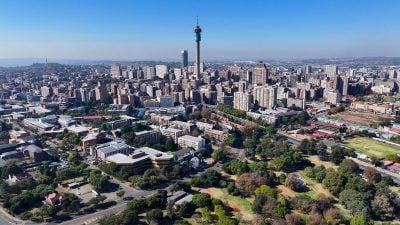It has been confidently forecast that Ghana’s economy will easily outpace those of Nigeria and Kenya both this year and in 2013. However, growth is likely to slow from the blistering 13.6% pace of 2011 (including recording a 17.6% rate in the second quarter of last year) when the country became the world’s fastest-growing. So, is Ghana entering a sweet, golden era?
A poll conducted among financial professionals by the Thomson Reuters organisation has shown that Ghana’s GDP growth will slow to around 8% in 2012, even though the country recorded an impressive 13.6% economic growth for 2011, making it the world’s fastest-growing economy last year. Last December, Britain’s leading business newspaper, London’s Financial Times (FT) praised Ghana, calling it an “African success story”.
“While much of the world is fighting to avert a fresh downturn, Ghana’s economy has expanded an estimated record 13.6 per cent this year,” the FT reported on 15 December. In a story that must have pleased President John Atta Mills’ ruling National Democratic Congress (NDC), the FT said: “After the debt write-offs of the past decade, many [African] countries have relatively healthy balance sheets compared with Europe. Ghana has often led the pack in winning independence, tumbling into bankruptcy, establishing democracy, and now in its potentially transformational economic growth.”
The paper recounted how in 2010 Ghana became one of a few countries to be categorised as lower middle income. This, the FT said, was after the national accounts were reappraised and annual GDP per capita raised $500 to $1,300.
In 2011, the paper said, “on top of a record cocoa harvest of more than one million tonnes, and soaring gold revenues, Ghana began pumping oil for the first time. The additional earnings will help to cushion the economy against external shocks.“ According to the Thomson Reuters poll, the predicted slowdown in Ghana in 2012 will be offset by the revenues beginning to flow from commercial oil production.
But the West African nation has more than the oil sector to build upon – it is also a large gold and cocoa producer. Some commentators have noted that with the oil price being so buoyant, given current geopolitical concerns about disrupted supplies from the Gulf, and gold being traditionally favoured as a defensive investment in uncertain economic times, such as we see with the current Eurozone crisis, there is only one conclusion. As both oil and gold are trading at historically high prices, Ghana’s export earnings will continue to flourish. There is even an argument that during an economic recession, as now being experienced in the Western nations, chocolate does well as a “comfort food”, which adds a third reason why Ghana’s economy is in such strong shape. The nation is the world’s second-largest producer of cocoa, the raw material for chocolates, and Ghana grows the best quality cocoa in the world! That is just as well, because the government’s 2012 budget – in this election year – is set to raise spending by 12%, to tackle poverty as well as to increase state revenues and narrow the public deficit to 4.8% of GDP from the estimated 5.1% of 2011. The current account deficit is also expected to narrow slightly to 5.7% of GDP next year from 6.1% this year.
King cocoa
Cocoa is the mainstay of Ghana’s agricultural sector, and the crop supplies about one-third of all export revenues. The other key export products include timber, coffee, and yams.
Thanks to favourable Harmattan winds and climatic conditions, Ghana’s cocoa crop increased by 20% in the last growing season. Ghana, with neighbouring Côte d’Ivoire, represents well over half of the world’s total production of 3.5m tonnes.
Although Côte d’Ivoire is the world’s largest cocoa producer, Ghana produces higher-quality cocoa beans, which command a premium price on the world market. This is invariably credited to the country’s grading system that demands top quality beans from farmers.
Last year, the chief executive of the state-owned Cocoa Marketing Board (Cocobod), Anthony Fofie, reported that Ghana had reached the one million tonne production target. Cocoa farmers are generally smallholder growers, and Cocobod supports them with an extensive outreach programme, assisting them to counter the crop’s main pests and disease risks.
Cocobod also works closely with the Cocoa Research Institute of Ghana in developing high-yielding early-bearing hybrid cocoa types supplied to farmers as seed-pods. The institute now produces about three million hybrid pods and raises about two million seedlings each year.
Chocolate production has been going in Ghana for decades at a processing factory at Tema which produces the Golden Tree brand. Golden Tree exports a range of chocolate products such as spreads, drinking chocolate, and confectionary, as well as seven flavours of chocolate bars, to international markets in the US, Europe and further afield.
Furthermore, the global Fairtrade organisation has made headway in the country since setting up the Kuapa Kokoo Cooperative Union, representing nearly 50,000 farmers and producing as much as 40,000 tonnes of cocoa beans. Kuapa Kokoo also owns 45% of the UK Fairtrade chocolate company, Divine.
Dairy Milk, owned by Cadbury’s (itself owned by Kraft) and the UK’s best-selling chocolate bar, became a Fairtrade certified brand in 2009, which increased the amount of Fairtrade cocoa sourced from West Africa. The move is part of Cadbury’s Cocoa Partnership, a $70m initiative over 10 years designed to help cocoa farming communities across the developing world.
Both Nestlé and Mars have followed Cadbury’s Fairtrade lead, branding their Kit Kat and Maltesers, respectively, as Fairtrade products. This, essentially, guarantees to consumers that the cocoa used (as well as sugar) has been sourced and produced ethically and sustainably.
Gold coast
Leaving cocoa aside, Ghana has the second-largest gold deposits in Africa, after South Africa. The nation derives a huge chunk of its export earnings from gold, which accounts for over 90% of Ghana’s total mineral exports. One estimate calculates that Ghana’s gold mining sector grew by some 5.7% in 2011, recording earnings of $2.84bn.
The world gold price has remained robust, even if fluctuating fairly widely, but is still more than three times what it was less than a decade ago.
Major multinational mining companies with interests in Ghana include Gold Fields of South Africa (majority owned by AngloGold Ashanti), Newmont of the US, Golden Star Resources (also US headquartered), and AngloGold Ashanti (South Africa). There are also a multitude of junior international mining companies, mainly from Canada, South Africa, Australia, and more lately China.
AngloGold Ashanti is a global gold miner with operations in 10 countries and six in Africa, including Ghana where it has two mines, the Obuasi and the Iduapriem. It holds a 71% stake in its subsidiary, Gold Fields (Ghana) which operates the two mines at Tarkwa and Damang.
Newmont Mining has announced plans to increase its annual gold output from its Ahafo Mine at Kenyase in the Brong Ahafo Region to 1.2m ounces (oz) by 2014 and 1.7m oz by 2017.
Newmont, the world’s largest gold producer, also has two mine development projects at Ahafo and Akyem.
With the gold market remaining bullish, the future of the industry in Ghana looks positive – even if the government signalled last December that it intended to ensure a bigger take from the industry. There is also a substantial contribution from the indigenous, informal gold mining sector – not to be confused with illegal mining. A study by Kofi Tetteh, published by the Minerals Commission of Ghana, says this sector contributed 23% of total gold production in 2010, selling 776,000 oz of gold to officially approved agents, valued at $797.60m, and employed one million workers.
For its part, the Ghanaian government has said it will encourage mining companies to collaborate and support the country’s small-scale miners. Government also intends to provide health, safety and environmental risk information, and safety guidelines for this sector.
Want to continue reading? Subscribe today.
You've read all your free articles for this month! Subscribe now to enjoy full access to our content.
Digital Monthly
£8.00 / month
Receive full unlimited access to our articles, opinions, podcasts and more.
Digital Yearly
£70.00 / year
Our best value offer - save £26 and gain access to all of our digital content for an entire year!
 Sign in with Google
Sign in with Google 


